
Exclusive Interview with Craig Pollock
Atlas F1 Editor in Chief
BAR shareholder, Jacques Villeneuve's manager, CART team owner - Craig Pollock, motor racing's smoothest operator, talks to Biranit Goren about Villeneuve's options for 2004, CART as a feeder series, the politics of Formula One, and more. Exclusive for Atlas F1
"His body's not that bad - sometimes the towel falls down, it's very good!" Pollock retaliates, laughing aloud at the scene. And the impossibility of a driver getting away with it, or a major team shareholder making fun of it all, is just so matter-of-fact with Pollock, because he has the face of a mischievous boy; his baby blue eyes twinkle with delight. It's why the most unconventional driver of the paddock has been his client and friend for so many years; and why Pollock seems to have gelled so well into the world of motorsport, relishing at the paddock schmoosing and swimming all too well among the Formula One piranhas.
It's been ten years now that the Scotsman has been managing the career of Villeneuve - twenty years since they met at the College Beausoleil in Switzerland, where Pollock was the director of sports and young Villeneuve a promising skiing student. Legend has it the two befriended at once; in reality, though - and while they maintained contact throughout the first decade of their acquaintance - it wasn't until Villeneuve himself approached Pollock in 1993, while driving in the American Formula Atlantic, that the two also became involved business-wise. Since then - with a CART championship title, an Indy 500 win, and a Formula One World Championship in 1997 - it's hard to fathom one man without the other.
And yet Pollock, for the first time since his involvement in motor racing, is making the first steps entirely without Villeneuve, setting up shop in the CART series with PK Racing - a team he founded four months ago along with American businessman Kevin Kalkhoven. That, after failed attempts last year to buy out the now-defunct Arrows team, and alongside the 35% shares he still maintains in British American Racing.
And there's always Villeneuve's career to maintain - a challenge in itself nowadays, with the French-Canadian seeking a seat for next year in a winning car, and all too often entangled in a war of words with his new teammate, Jenson Button, or his current team boss, David Richards.
In between those worlds - managing the career of a now-struggling World Champion, overlooking his 35% investment in BAR, and the running of a newly-running CART team - Craig Pollock smoothly operates. One day he's in the Barcelona paddock; the day after he's in the CART pits at Brands Hatch.
Pollock the Driver Manager
Pollock is all too aware of the delicate situation his client is in and treads lightly when asked about BAR, or Villeneuve's future, or anything else that might be political. With Pollock, though, everything is political, and his situation gets allthemore complicated when you consider he is still part-owner of the team in which his driver is working. And if that doesn't spell 'conflict of interest' well enough, add to the fore the fact that Villeneuve is quite often publicly at loggerheads with the team management - whether it's about his own salary, or about the team's competitiveness.
Pollock: "Oh, it's much easier now that I'm not involved in the day to day running of the team. I'm here simply and purely as a shareholder and director of the holdings company, so I can sit a little bit on the outside.
"But when Jacques was at loggerheads with the team, potentially quite a bit of the stress and the strain came from my own situation. You know, all the talk about trying to get rid of Jacques was simply about certain people trying to weaken my own position [in the team]. After all, when I stepped down as a team principal it was in the interest of some to weaken my position in the team, and part of that was to psychologically work with Jacques. That's what I think has happened, and basically my situation didn't help Jacques's situation. So I'm faulting myself as well, that's what I'm saying."
BG: What it's like for him now? There's just a feeling of constant undergoing tension in the team between himself and the management
Pollock: "Well, I think there'd be a lot less tension if it was absolutely clear what was going to happen with him next year, and the timing to clear that up is coming up in just about a couple of months. The tension is that he's sitting as a free agent, and we have to make sure that his future is with the right team. If it's this one, all the better. If it's not..."
BG: I get the feeling he really wants to move to one of the top teams
Pollock: "Yes, that's probably right."
BG: So is that what you're focusing on for next year?
Pollock: "I'm not going to divulge our plans, but I would say the focus is going to be on four teams in the paddock, with all four being all-manufacturer teams. So... that would have to be the focus for the future, where he should be going."
BG: Are you optimistic he's going to go there?
Pollock smiles widely, that spark in his eyes now shining bright. "I'm very optimistic, extremely optimistic," he says.
BG: Wow, that's quite a smile you put on...
Pollock: "Why wouldn't I be optimistic in that?"
BG: I don't know where things stand, but you know...
BG: And you see that happening?
Pollock: "I didn't say I see that happening, I just said that's what the sport needs. To me, that's the dream scenario, and I can only dream about it because I can't really influence it."
BG: Hypothetically, do you ever see a situation where Jacques and Michael Schumacher would be in the same team?
Pollock: "Hypothetically? Absolutely. But I don't see it [happening] realistically. There'd be nothing that would worry us in doing that, but I think on Michael's side... Michael doesn't need it, because he controls his environment. Why would he potentially want to take in that tension and stress, into a team that he controls and has a balance in? So why create a difficult situation when you can have an easy situation? And I have to respect him for that.
"You know, if you're a driver or a driver's manager, you try and control the environment for the driver - and Michael has that controlled. Jacques's character is so strong, that if he came in, he could potentially create destabilisation."
BG: So has there ever been a situation, factually, that Michael said 'no' to teaming up with Jacques? Did it reach that?
Pollock: "I have no idea. We wouldn't know. I know that Bernie [Ecclestone] would love to see Jacques and Michael together [in the same team] - he said it to me, he said it to other people, especially last year. And I'm sure he's also said that to [Ferrari president Luca di] Montezemolo and [Ferrari team principal] Jean Todt. But I wouldn't know if Michael said 'no'. It could be di Montezemolo, it could be Jean Todt that said 'no'. I don't know."
BG: Well just imagine the headache as a team boss...
Pollock: "But it wouldn't be our headache - we'd have everything to gain and nothing to lose."
BG: What's the situation in BAR now, between Jacques and Jenson Button? They started off with sparks between them... has it subsided?
BG: There's a hint of criticism in what you're saying over how the team is being managed, how things are handled between the drivers. Do you think the whole situation isn't handled right?
Pollock thinks at length before replying. "Without getting into any politics, no, I don't think it is being very well handled, and I think there's a lot of people to blame," he eventually says. "I think there's blame that should be put on my shoulders, there's blame that should be put on Jacques's shoulders, there's blame that should be put on Jenson's and his management's shoulders, and there's blame that should be put on the team.
"When you ask Jacques Villeneuve a question, you just know you're going to get an extremely straight and non political answer - that's a problem too, you know. Sometimes it's better to say less than say more. So that's where I think Jacques has gone wrong, but at least in what he has said, he's been honest about it. Sometimes it's stupid saying it.
"Where the team is concerned... I think the team should run a team and keep out of politics, let the situations be as they are and not try to manipulate it."
The team should run a team?
Pollock is an eloquent speaker (even if he says 'potentially' too often, and not always in context) - and his choice of words are not random. But you'd be hard pressed to get him to say outright 'yes, I think David Richards is not doing his job well' - or even just mention Richards by name. He won't confirm or deny, but sources at BAR say that Pollock, with his 35% shares, has been against Richards at every board of directors' voting, including that of signing the contract with Prodrive that would see Richards run the team.
Moreover, when asked about the constant rumours of dissent among BAR's board of directors about Richards' success in running the team, Pollock simply says: "I don't want to talk about team politics." Neither does he comment about information that Richards - who was quick to criticise Villeneuve's salary last year - is himself one of the highest paid employees in Formula One, with a reputed (though unconfirmed) salary of $5 million USD a year being paid to Richards' company, Prodrive, for his managerial services at BAR.
Speaking of salaries, it's time to settle an old score.
BG: There's always this argument among fans that I'd like you to clear once and for all: who pays Villeneuve's salary? Is it BAT or BAR?
Pollock grins.
BG: The reason I'm asking is because last year, when Richards publicly criticised Villeneuve's high salary as being a burden on the team's budget, the argument against this was that Jacques's salary is not part of BAR's budget anyway, since it was paid by BAT. So I'm just trying to figure out who's right and who's wrong
Pollock: "I don't think it's a question of who's right or who's wrong; It was simply a question of it being totally wrong to bring this up in the first place, when the contract has already been signed. You honour your contracts. Jacques's last deal - which was a three-year deal - was negotiated when I was a team principal, although it was not negotiated by myself..."
BG: ...which is another misconception, one which I admit I've shared...
Pollock: "Yes, well, the reason is it would have been a total conflict of interest if I had [been involved in the negotiations]. So the deal was negotiated between the chief operating officer of British American Racing, Ian Ross, and Jacques's lawyers in Monaco. And that was it, between the two parties, on the insistence of BAT - because BAT had to up the sponsorship budget to cover Jacques's salary.
"So the budget wouldn't have been there otherwise - BAT had to OK [Jacques's new deal] and sign it. So it was never part of the original sponsorship budget, and in reality the budget was increased to accommodate Jacques from an outside sponsor.
"But, you know, to me that's water under the bridge, and I believe David has since fully understood that he stepped on quite a few toes. Really, it's no longer an issue."
Pollock the Team Owner
Pollock's involvement in CART came as little surprise to those who followed the man's motor racing involvement in the last few years. After convincing BAT to buy out the Tyrrell outfit and found the BAR team in 1999; after getting Honda as partners in 2000; and after stepping down as BAR's team principal, Pollock continued to seek opportunities for himself to be involved in Formula One, primarily last year when he attempted to buy out the financially struggling Arrows team. It was evident he was very much on the look out for an opportunity to be involved in the sport beyond driver management.
Since then, with four races into the 2003 CART season, PK Racing - fielding one driver, BAR former test driver Patrick Lemarie - is not setting the motorsport world on fire, but Pollock seems pleased and unsurprised by the team's current performance.
"It's coming along slowly," he says. "We started in January - just to actually purchase bits and pieces and three different companies to get it together - and we're now at the beginning of May. So in four months we've done three races, which we've taken as pure testing - as opposed to expect to get podiums, which we were certainly not going to do.
"But the team is solid; we built a solid base and we have got something to work on there. And the key for the future survival and future health is all going to be into the commercial side - sponsorship and financial stability. Because technically we know that it's just a question of time that we can build up the technical stability."
BG: It's an interesting time to go into CART; during the winter break it wasn't at all clear what kind of a future the series is going to have, and I'm not sure that it's cleared up right now
Pollock: "The health of CART last year wasn't clear and the reason it wasn't clear was because the big teams were pulling out. What basically happened is that quite a few very wealthy people in the US saw potential because of the fact that CART was right at the bottom of the hill - you can't go any further; nobody jumps off a cliff and keeps on digging when he hits the sand, you try and climb back up the cliff.
"So what has happened, is that it actually made that turn - because of the wealth still built into the series, and I think it's going to have a good future. I'm a believer in the old Indy car-style racing, which is what CART is about, and I think the key people involved are willing to invest enough money that they will try and recreate the brand. Although I don't know whether it's going to be CART or whatever it's going to be called - my gut feeling is the name will change.
BG: I've always had the impression that because of the split between CART and Indy, both sides lost out and CART is not going to regain what it was 10 years ago until something is done to reunite the two series.
Pollock: "When the split happened, Tony George couldn't get on with the CART team owners and board because he wanted more power over the series, because he had one race - Indy 500. He did manage to get the split, and it did totally disrupt open wheel racing in North America. And a lot of the team owners from the CART series tried to meet with Tony George and get everything back together. After many years they decided that you just can't do it, he's not willing to do it.
"It's got to be something that is really linked into modern street racing. Nobody knows, to me, what CART means. Every time I think of CART, I think of a go-kart, not of a Formula One-style racing. So you got to create that identity, and you got to get good people in there that are capable of doing it, and I think that's all starting to happen."
BG: What do you think of the recent idea of turning CART into a 'feeder series' for Formula One?
Pollock: "You know, it has been a feeder series for Formula One without knowing it for many years. If you think back, then you got your Emerson Fittipaldi, the Andrettis. You got Montoya coming out, you got Jacques coming out. And it has fed Formula One. It's a logical place for very good drivers to come out of. It certainly, in the past, been a far more competitive series than, say, F3000. Plus, the drivers are better trained - not because of the cars, but because of the fact that CART has international media, it's a paddock in itself for them. They are the top drivers there already, the stars across there. So therefore they are better trained as drivers coming into F1.
"So it's not such a big step as coming out of F3000, who nobody gives a shit [about], you know. The drivers [in F3000] hardly get interviewed - you have to go and look for the interviews. But here [in CART] they got television cameras in their face, they got the pressure of a real paddock around about them. That's why it makes sense that it's a so-called feeder series. But should you call it a feeder series? No, no."
BG: Isn't that a shift from the past, where CART used to be perceived as the retirement series for F1 stars?
Pollock: "It switched around with Jacques, when he won the [Indycar] championship, and I was very heavily criticised inside Indycar at the time for pre-negotiating a contract in Formula One prior to [Villeneuve] having won the championship. But the timing was right, and [CART] then realised they benefited hugely by Jacques coming over. I mean, the youth stepping up and coming out... it drove interest for the rest of the youth to come in there instead of going to certain other series. Like Montoya coming to CART before Formula One.
"All this was happening because it worked with Villeneuve winning in CART and then going to Williams, so Williams started to put his drivers in [CART] to be trained. You had Junqueira and Montoya being trained across there, because [Williams] couldn't give them a seat in F1, and it's far better for him to pay for a seat across there, get them trained and see if they're going to come out on top. That's what is happening. So it's really the move that Jacques made, I think it made big changes inside of the sport."
BG: Still, CART today is not what it used to be in Jacques's days
Pollock: "Well, it scares me to death... you talked about the split between [Indy and CART], and there was one series - a split between the two meant there is now not enough sponsorship to go around, the TV stations are confused, the spectators are confused, they don't know which way to go. Now can you imagine if there's a split in F1? That worries me tremendously. Because today there's a strength behind Formula One: all the manufacturers are here. And if everything just splits up, and Bernie fights what's going to happen, then there are two series and you're dead. You just cannot survive."
BG: Do you think there's going to be a split in F1? The general perception is that it's just a bit of a poker game
Pollock: "I don't think there's going to be a split, but I don't think it's a game either. I think it is a negotiation tactic - there are warning shots being fired across certain people's bows, to pay attention. And the manufacturers are saying, 'guys we are spending [each] over 200 million a year to develop engines for F1, and that doesn't even include our marketing costs to promote what we're doing inside the series. We are spending a huge amount of money every year, we want to be listened to'. I think it's their right to be listened to; so they should! We shouldn't forget what they need to get out of spending so much in F1."
BG: Bernie's stance, if to quote him, is saying 'Mercedes doesn't give me a share of their sales based on the marketing success they have in F1. Why should it be the other way around?' - there's always this tug of war between the manufacturers and the organisers, it's always been like that.
BG: Setting up a CART team, did that replace your wish to run a team in Formula One, or are you still pursuing that idea?
Pollock: "Starting up PK racing was a surprise to me as well. To me, PK racing is a business, just an opportunity to start up a business in the United States, to be a major shareholder inside the company, use my area of expertise to make sure that cars are up and running in a given time frame. And I see it really as a business more than anything else. I surprised myself by doing it, because I didn't expect to do it - I didn't know if I really wanted to do it - but it was also an opportunity to get into the CART series and have my voice inside the series.
"You see, you cannot run a Formula One set-up and run a Formula One team without gaining a certain amount of knowledge, understanding how to pull the right strings to get some things to happen inside the sport. And, also, there was maybe a little bit of frustration for me in the past in Formula One, where it's blatantly obvious what you can do to help the sport and help the series, but because you're the new guy in there, you're treated as if you're an idiot - just sit down and keep your mouth shut and let these old guys make the decisions.
"When you go into CART, you can bring in the ideas and you're being listened to by the other guys, because they know that they need to get the new ideas and new vision coming in. So maybe I wished to try and do that, and actually that worked out."
BG: I'm really surprised to hear you say that, because in the last couple of years all I've heard about you is that you accommodated very swiftly into the political world of Formula One, that you had the mind for business and politics
Pollock: "Well, I don't think that they think of me as an idiot, I'm just saying that when you're new, you're treated as one."
BG: Well I can think of other team owners that were treated that way...
Pollock: "And maybe some of them deserved it, you never know... Maybe I deserved it! Look, I do believe that you have to earn respect, you shouldn't expect to be respected because you simply managed to get somewhere. You have to prove first that you're capable of being there as well. I think that takes a bit of time, so I don't think you should go and bang your fists from day one.
"It takes you a long time to understand the politics inside Formula One, especially between teams and team principals. Because, believe me, we're huge on politics. And it takes you time to learn who is willing to work with you, and who's just there to block; who actually has power and who doesn't."
BG: So who is your favourite team principal in F1, then?
"Ron's a little bit, at times, a knight in shining armour - as long as he gets his own way. Frank is very loathed to change, absolutely sticks by his principals. And the two of them fully understand the history behind the sport. But history tends, in my mind, to stop the sport from going forward.
"Overall, I think Jean Todt... I think he's probably today the best team principal, because he's not an owner, he's just doing his job. But he is not the power behind Ferrari, and he can sit in a teams meeting and all he can do is relay the wishes of the mother company."
BG: So you still have aspirations to come back to F1 as a team owner?
Pollock: "Only if it was right. I don't lose sleep over that. If the right deal was there and I absolutely felt it was a good thing to do for myself, I would consider doing it."
Don't be surprised if the right deal comes along in the next couple of years; with his charm and ability to bring in the money, Pollock may just well return to the political wheeling and dealing of running at the forefront of Formula One.
In Formula One today, there are certain situations you just don't expect to be in. I mean, imagine interviewing Ron Dennis while David Coulthard idles about wearing only a skimpy towel around his waist - it just couldn't happen. Well, not unless you're interviewing Craig Pollock, and the driver walking past you is Jacques Villeneuve.
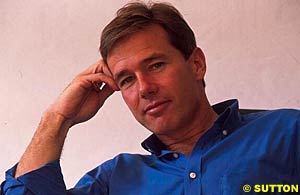 Journalists are always sitting at every teams' motorhome, and media interviews are being held at practically every given moment of the Grand Prix weekend. But in this politically-correct era of modern Formula One, with big-money sponsors always walking between the tables, drivers just don't normally walk around in skimpy towels, climbing up see-through spiraling steps and pausing mid way to scratch their feet as though they couldn't care less about prying eyes down below.
Journalists are always sitting at every teams' motorhome, and media interviews are being held at practically every given moment of the Grand Prix weekend. But in this politically-correct era of modern Formula One, with big-money sponsors always walking between the tables, drivers just don't normally walk around in skimpy towels, climbing up see-through spiraling steps and pausing mid way to scratch their feet as though they couldn't care less about prying eyes down below.
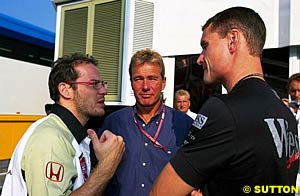 BG: What do you do when Jacques and the team are on battling grounds? Which side do you take, so to speak?
BG: What do you do when Jacques and the team are on battling grounds? Which side do you take, so to speak?
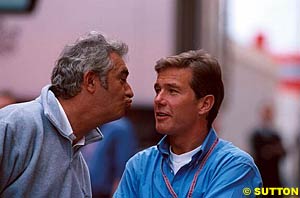 Pollock: "Look, in this paddock today, you've got two World Champions. And what this sport really needs nowadays is a battle at the front. Create the 'Senna versus Prost' situation again - that was the best time in Formula One."
Pollock: "Look, in this paddock today, you've got two World Champions. And what this sport really needs nowadays is a battle at the front. Create the 'Senna versus Prost' situation again - that was the best time in Formula One."
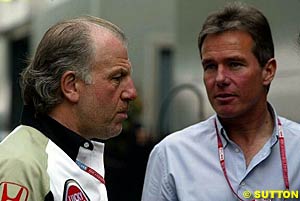 Pollock: "I think the sparks weren't traded between the drivers, I think it was potentially created inside the team itself. I think the two drivers fairly much got on, but there were certain things that have been said in interviews by both parties that shouldn't have been said, didn't need to be said, and both drivers fully understand now that all they have to do is get up and work, not get involved in a war of words."
Pollock: "I think the sparks weren't traded between the drivers, I think it was potentially created inside the team itself. I think the two drivers fairly much got on, but there were certain things that have been said in interviews by both parties that shouldn't have been said, didn't need to be said, and both drivers fully understand now that all they have to do is get up and work, not get involved in a war of words."
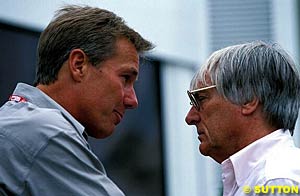 "OK," he says, clearing his throat before proclaiming: "Villeneuve's salary is paid by British American Racing, but his salary is part of a deal that has been worked out with BAT."
"OK," he says, clearing his throat before proclaiming: "Villeneuve's salary is paid by British American Racing, but his salary is part of a deal that has been worked out with BAT."
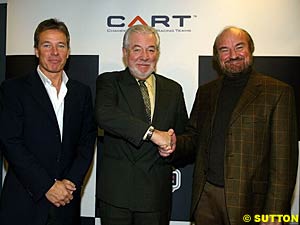 But with Formula One opportunities few and far between, Pollock found himself with the right cash and nowhere to invest it in. Which is exactly where PK Racing was born - CART was in a serious need of new teams, and Pollock was willing and able to give it a try.
But with Formula One opportunities few and far between, Pollock found himself with the right cash and nowhere to invest it in. Which is exactly where PK Racing was born - CART was in a serious need of new teams, and Pollock was willing and able to give it a try.
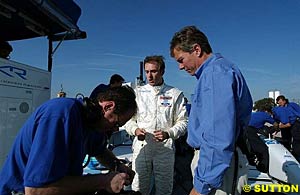 "So what we have done is said, you know, forget about Indycar because today Indycar is an oval racing series, going around in circles. So that is the 'Oval Racing Series' - call it Indy. What we have to do is create our own brand and make sure that we just forget about the other side and build ourselves as the 'Road and Street Racing Series'. That's why I'm a big protagonist inside the CART series of changing the name.
"So what we have done is said, you know, forget about Indycar because today Indycar is an oval racing series, going around in circles. So that is the 'Oval Racing Series' - call it Indy. What we have to do is create our own brand and make sure that we just forget about the other side and build ourselves as the 'Road and Street Racing Series'. That's why I'm a big protagonist inside the CART series of changing the name.
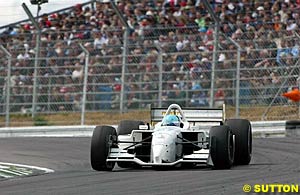 Pollock: "Well I'm still a big believer [in manufacturers] and I think Bernie shouldn't forget where he comes from either. He was made the president of FOCA by the team owners inside Formula One. That's where he got his money. Because he was a constructor. To run it, he had to give up his team Brabham. And he should maybe go back to his grass roots and remember exactly where he came from. Because without the manufacturers there are no teams, and without the teams, Bernie doesn't make money. His business is the teams, nothing else. He can't remove the teams and have a race. The teams should be listened to and the manufacturers should be listened to."
Pollock: "Well I'm still a big believer [in manufacturers] and I think Bernie shouldn't forget where he comes from either. He was made the president of FOCA by the team owners inside Formula One. That's where he got his money. Because he was a constructor. To run it, he had to give up his team Brabham. And he should maybe go back to his grass roots and remember exactly where he came from. Because without the manufacturers there are no teams, and without the teams, Bernie doesn't make money. His business is the teams, nothing else. He can't remove the teams and have a race. The teams should be listened to and the manufacturers should be listened to."
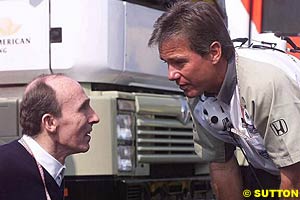 Pollock: "I'd say there are three team principals that I can, in my mind, fully respect: Ron [Dennis], Frank [Williams], and Jean Todt. And I fully respect them for all different reasons. But they all have their own agendas, and it takes you a long time to understand the agendas of these team principals.
Pollock: "I'd say there are three team principals that I can, in my mind, fully respect: Ron [Dennis], Frank [Williams], and Jean Todt. And I fully respect them for all different reasons. But they all have their own agendas, and it takes you a long time to understand the agendas of these team principals.
Please Contact Us for permission to republish this or any other material from Atlas F1.
|
Volume 9, Issue 20
Atlas F1 Exclusive
The Acid Test: Two Weeks with Toyota
Exclusive Interview with Craig Pollock
Giancarlo Fisichella: Through the Visor
Articles
Season in the Sun: Part II
Hype
Austrian GP Preview
2003 Austrian GP Preview
Austrian GP Facts & Stats
Columns
The Fuel Stop
The F1 Trivia Quiz
Bookworm Critique
On the Road
Elsewhere in Racing
The Weekly Grapevine
> Homepage |